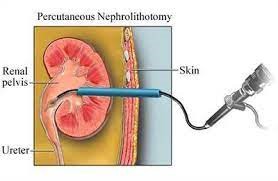Kidney stones are formed in the urinary tract due to crystallization of chemical compounds in the urine. PCNL is a technique used to remove certain stones in the kidney or upper ureter (the tube that drains urine from the kidney to the bladder) that are too large for other forms of stone treatment such as shock wave lithotripsy or ureteroscopy.

What happens during the procedure?
A PCNL typically lasts one to three hours. After you are under anesthesia, the doctor makes a small incision in your back. The doctor inserts a protective sleeve called a sheath through your back and into your kidney. The doctor then passes a video scope called a nephroscope through the sheath to locate and remove the kidney stones. To help your kidney heal and drain urine during the healing process, your doctor may place a nephrostomy tube or a ureteral stent at the end of the procedure. Some patients require a second operation to remove all of the stone. If so, the nephrostomy tube and stent may be left in place until the next operation.
What should I do before the procedure?
There are three important things to do before your procedure:
Talk with your doctor. Let your doctor know:
- All of your prescription medicines, vitamins and supplements, herbs and natural remedies, and over-the-counter drugs.
- Any known allergies you have to medicines and the contrast agent used in some X-rays.
- If you may be pregnant Review the pre-operative directions. Make time to review these directions provided by your doctor. For example, you may need to :
- Go to appointments for medical tests before the procedure, such as an electrocardiogram (EKG), X-rays, and blood and urine tests.
- Discuss with your doctor medicines that might increase your risk of bleeding, for example, aspirin, ibuprofen, warfarin, clopidogrel and non-steroidal anti-inflammatory drugs. You may need to stop taking some of these medicines before the procedure.
- Take antibiotics, if prescribed, to help prevent infection.
- Check with your doctor on which of your regular medicines to take the morning of surgery. On that day, take these medicines with only a small sip of water.
- Have nothing to eat or drink after midnight the night before surgery (except the sip of water with your morning medicines).
Arrange for a ride home
After the surgery, you cannot drive yourself home. Before the procedure, ask a family member or a trusted friend to pick you up and take you home. Most hospitals and surgery centers will not allow you to take a taxi home after the procedure